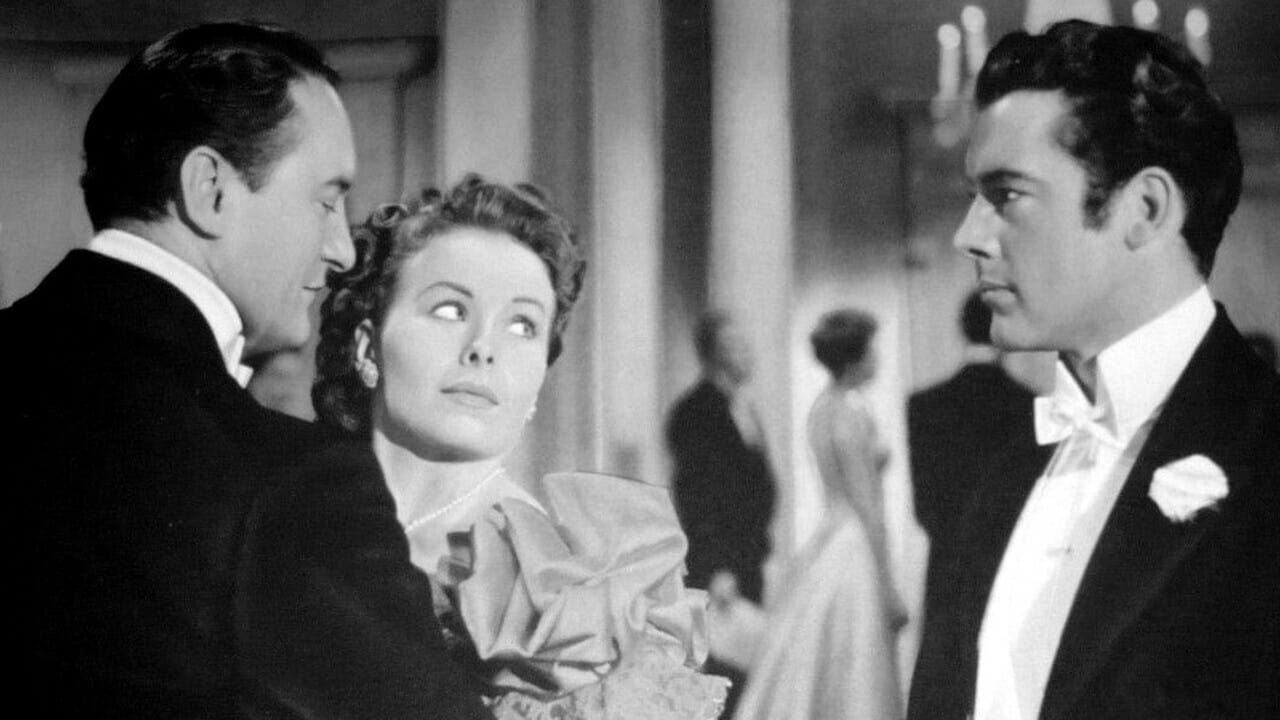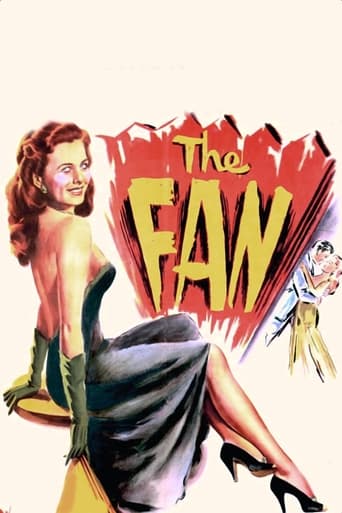




the leading man is my tpye
an ambitious but ultimately ineffective debut endeavor.
View MoreYour blood may run cold, but you now find yourself pinioned to the story.
View MoreOk... Let's be honest. It cannot be the best movie but is quite enjoyable. The movie has the potential to develop a great plot for future movies
View MoreTruncating the title and adding a little addendum of his own to the story director Otto Preminger offer's up a well polished version of Oscar Wilde's, Lady Windermere's Fan. A devastating Victorian satire in its day Preminger updates the opening to post war London with two of the now doddering principals drawn once again together over the fan re-kindling memories of when it first played such an important role in their lives.At an auction selling objects from bombed buildings Lady Erlynne (Madeline Carroll) attempts to reclaim a fan given her decades earlier. The auctioneer is reluctant to part with it on her say so unless she can find a witness. She goes and looks up "cad from the past" Lord Darlington (George Sanders) to vouch for her and after an initial re-buff the two recall the bell époque together and how his deviousness almost ended a marriage while her sacrifice saved it.Preminger seamlessly injects the war as a catalyst to springboard the play as well as add a sly touch that reveals itself comically at the end. With his ability to speak film language as well as anyone The Fan flows with long takes and fine performances by the principals Carroll, Jean Crain, Richard Greene and George Sanders who seemed born to play Wilde characters.The Fan is one well crafted work that Preminger elevates by eschewing the easy task of filming a classic stage satire and adding a stark but unobtrusive contemporary sub plot that not only advances the storyline but in the true spirit of Wilde pays homage to his timeless words.
View MoreI HAVE TO seriously differ with the same review of this gem of a film. Agreed that George Sanders is wonderful (as usual) and that the bookends of the film are not necessary though rather charming, but the film is a jewel, all the performances are very good and MADELEINE CARROLL in her last film ever is totally wonderful and EXQUISITE.. Jeanne Crain does a credible job playing a British aristocrat, accent and all and Martita Hunt as always steals every scene she is in. The sets and costumes are stunning, and it is a pity it was not filmed in color. Otto Preminger is a strange choice as a director for this vehicle but he is always fascinating, even his misfires and this certainly is NOT one of them.A must see believe me.....
View MoreWhen I got home from a screening of THE FAN I sat down to re-read "Lady Windermere's Fan," and came to the conclusion that the film is significantly better than the play. I don't think this opinion is as heretical as it sounds. Wilde's literary reputation rests largely on his exquisite aphorisms and his one perfect work, "The Importance of Being Earnest," my nominee for the funniest play ever written. Before he hit his stride with "Earnest," Wilde's plays were an awkward hybrid of sophisticated comedy and stilted melodrama, with creaky plots that heavy-handedly flogged their worthy message of tolerance. There is always a woman with a past, an acidulous dandy, a shameful secret, and a self-righteous young man or woman who has to come to terms with that secret.Otto Preminger seems like a poor choice to interpret Wilde. He did not have a light touch, and anyone expecting sly, frothy comedy from THE FAN will be disappointed. (Watch the Lubitsch silent version instead.) Preminger downplays the comedy-of-manners aspect without eliminating or destroying it, but he succeeds in translating the cardboard melodrama into something subtle, complex and moving. Preminger's gift was for creating ensembles in shades of gray, with no black villains or white heroes. Here the whole cast is tamped-down and naturalistic: there is no mannered camp about the comedy and no teeth-marks on the scenery after the dramatic peaks.The first half of the film is original, setting up the situation that the play lays in our laps in its first scene. To begin with there is a framing device set in contemporary post-war London, where the octogenarian Mrs. Erlynn (Madeleine Carroll) discovers the fan at an auction of unclaimed property from bombed buildings. In order to reclaim her property she has to prove ownership, so she tracks down Lord Darlington (George Sanders), now a doddering "museum piece" living in a remnant of his former home. We learn that Lord and Lady Windermere were killed in the Blitz; that the two worldly, ambiguous characters have survived the pure couple feels appropriate to a changed world. The frame gives the costume-drama portion a wistful edge; instead of the usual Hollywood gloss, here the past gleams through nostalgia like a flower buried in a paperweight.The flashback unfolds as Mrs. Erlynn relates her story to the reluctant and skeptical Lord Darlington. George Sanders might seem like almost too obvious a choice to play this role. Some of the dialogue ("As a wicked man I am a complete failure. In fact, there are some people who say I have never done anything really wrong in my life. Of course, they only say it behind my back") might have been written for that inimitable dry-sherry voice, at once rich, acid and smooth. But Sanders, like the rest of the cast, does not lean on wit, delivering the bon mots casually, almost under his breath. Instead, he comes as close as I've ever seen him to suggesting raw feeling behind the polished facade of disdainful boredom. As Lady Windermere, delicate Jeanne Crain turns the tiresomely shrill, uncompromising puritan of the play into a fresh, gentle innocent, a young woman of innate but untested fineness. It's like watching a paper doll come to life.But this is Madeleine Carroll's movie. All too often relegated to decorative roles, here she gives a nuanced performance as a complicated woman: flirtatious, scheming, unscrupulous, but ultimately brave and compassionate; proud but stricken with inconsolable regret. She manages the mother-love scenes with compelling emotion, never sliding into sentimentality. As a young woman Mrs. Erlynn left her husband and child for another man, breaking her husband's heart. In middle age, still relying on youthful allure and trailing a scandalous reputation, she returns to London. She is not above blackmailing her daughter's wealthy husband, Lord Windermere, who gives her large sums of money to spare his wife from learning the truth about her idealized mother, whom she believes is dead. Gossip turns this transaction into an affair, and Lady Windermere is devastated when she believes her handsome young husband has betrayed her.Interestingly, the film shows Lord W. initially attracted by Mrs. Erlynn, suggesting he is no plaster saint. But he hardly deserves the agony of having to choose between losing his wife's trust or destroying her illusions about her mother. Meanwhile, Lord Darlington seizes on the alleged infidelity to declare his love for Lady W. and beg her to leave her husband for him. Would he really have devoted his life to her, or would he have abandoned her after a year, as Mrs. Erlynn suspects? We're never sure, but we believe that he still regrets losing her. This must be one of the few cases in which the movie version of a literary work has a less happy ending than the original. The elimination of Mrs. Erlynn's last-minute marriage suits the darker, sadder, more mature tone of the filmand since we see her in hale old age we know that she landed on her feet somehow. There is the faintest hint that she and Lord Darlington might make a December-December match, but it's not overplayed.Few films have done a better job of hiding their stage origins; this one never feels static or talky, and the interpolated activities like a fencing match and a shopping trip feel natural and evoke an elegant lost world. THE FAN has more warmth and tenderness than many of Preminger's films, and if it doesn't belong with his very best, it certainly belongs with those, like DAISY KENYON, that deserve greater exposure and appreciation.
View MoreThe story of "Lady Windemere's Fan" is a touching portrait of repression and hypocrisy in England during the Victorian era. The pivotal character in the movie is the charming, mysterious wise and beautiful middle-age woman played by Madeleine Carroll, who returns to the conservative upper-class milieu that had banished and rejected her decades ago. She manages to come to terms with the most delicate and unresolved aspects of her past, but she has to pay a very high price for that. Nevertheless, she is a survivor and in her eighties she will be able to make a balance and reflect on that crucial episode of her past. Madeleine Carroll and George Sanders are perfectly cast as the middle-age charmers and schemers, and also sound believable as the frail but smart octogenarian survivors, and deliver great performances on the hands of Preminger, who is able to maintain a good rhythm and to capture what we might figure is the Victorian society's aristocratic milieu of gossips and intrigues. I also enjoyed Martita Hunt as a typical upper-class eccentric, manipulative and witty matron; and thought that both Richard Greene and Jeanne Crain were OK as the younger Windemere couple. I think that this underrated little gem deserves a wider distribution. I am very lucky that in Spain the DVD of "The Fan" has been released in September 2007.
View More